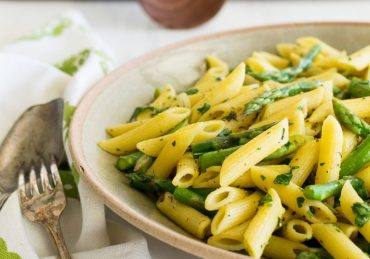Skip the cup of joe and start your day with a healthy green juice! This homemade juice is loaded with veggies that will give you the nutrients needed to power through busy mornings. This easy recipe can be customized to your liking. It’s vegan and gluten-free. Green Juice Juicing was all the rage a few years ago,…
Read More »
The post My Favorite Green Juice appeared first on Dianne’s Vegan Kitchen.
 Skip the cup of joe and start your day with a healthy green juice! This homemade juice is loaded with veggies that will give you the nutrients needed to power through busy mornings. This easy recipe can be customized to your liking. It’s vegan and gluten-free.
Skip the cup of joe and start your day with a healthy green juice! This homemade juice is loaded with veggies that will give you the nutrients needed to power through busy mornings. This easy recipe can be customized to your liking. It’s vegan and gluten-free.
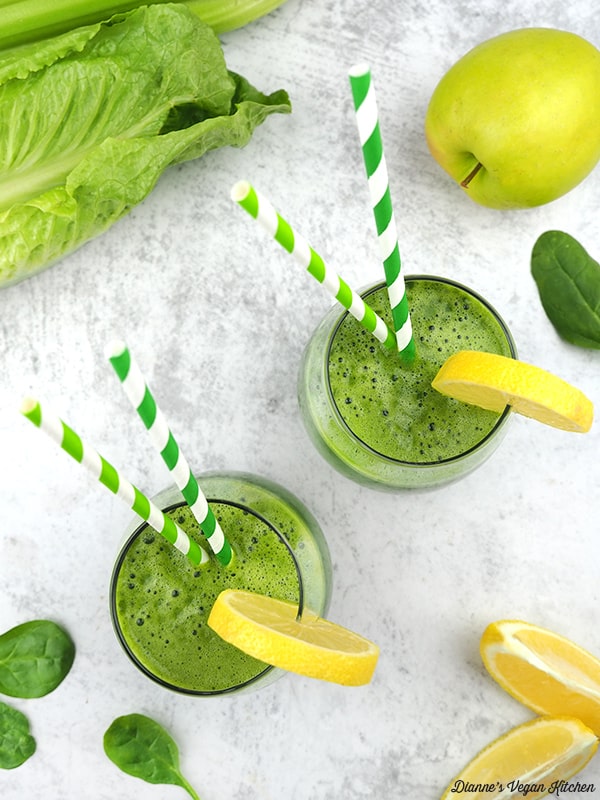 Green Juice
Green Juice
Juicing was all the rage a few years ago, when I first shared this recipe. And green juice was the juice of choice for most. It seems to fallen out of favor recently though. I’m guessing it’s because fresh pressed juices are readily available just about everywhere now. I’ve even seen them at Target! I’ve been guilty of picking them up rather than make fresh juice at home. Those juices come in plastic bottles though, and I’m working on reducing my plastic usage, so I’ve dusted off my juicer.
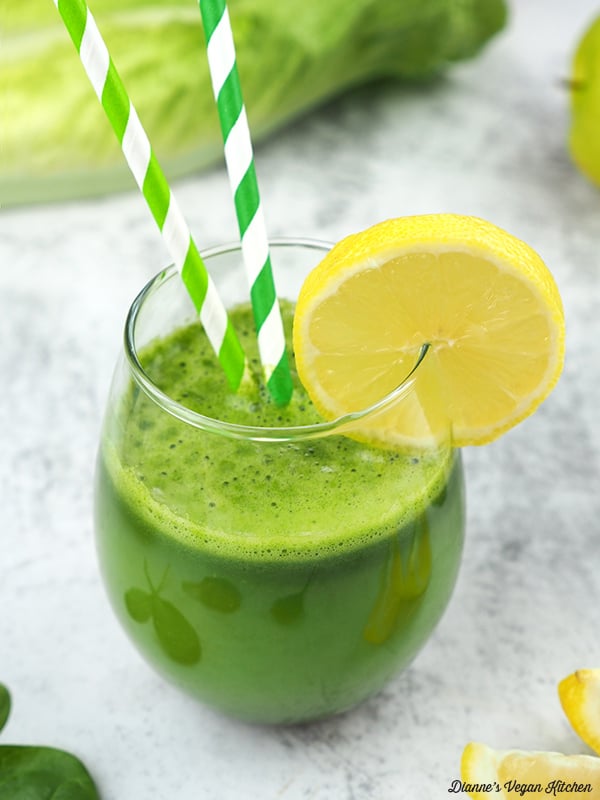 Juicers
Juicers
I’m on my third juicer. I bought my first one about 15 years ago. It was the cheapest one I could find. It was quick to juice and kind of easy to clean, but I got bored with it and gave it away. The second one was a Hurom slow juicer, and it was a gift from Dennis. It’s a pain to clean and is too tall to fit under the kitchen cabinets on the counter, so I used it once and put it in the pantry to be forgotten about.
A few years ago, Tribest sent me a juicer to review. It’s a slow masticating juicer (just like the Hurom juicer), so it takes a while to chop the veggies and juice everything, but it’s not too difficult to clean, and it fits on the counter nicely. I used it often at first, but then it ended up in the pantry alongside juicer 2.

Types of Juicers
There are a few different types of juicers:
Centrifugal Force Juicer. This is the most popular type of juicer. These juicers shred vegetables with blades at a high speed. They are fast and easy to clean, and they’re also less expensive than other juicers. However, they produce a lot of pulp, and you need to drink your juice right away.
Masticating Juicer (also know as Slow Juicers). These juicers crush vegetables with a slow auger, which takes a little more time than it would with a centrifugal force juicer. However, they create less pulp and more juice, and the juice doesn’t need to be consumed right away. They’re more expensive, but they can also be used to make nut milks and nut butters, too. Mine can also be used to make baby food and pasta.
Twin Gear Juicer. This type of juicer has two augers that crush the vegetables and then presses the juice out of them. The resulting juice is said to have a lot more nutrients in it than it would with a centrifugal force juicer or a masticating juicer. They’re on the pricier side, and they take a little more time to clean though.
Juice Press. Juice presses are the best type of juicers available. They extract juice from vegetables by slowing pressing them, resulting in a juice with a high nutrient content. However, they’re really expensive, and are too bulky for home use.
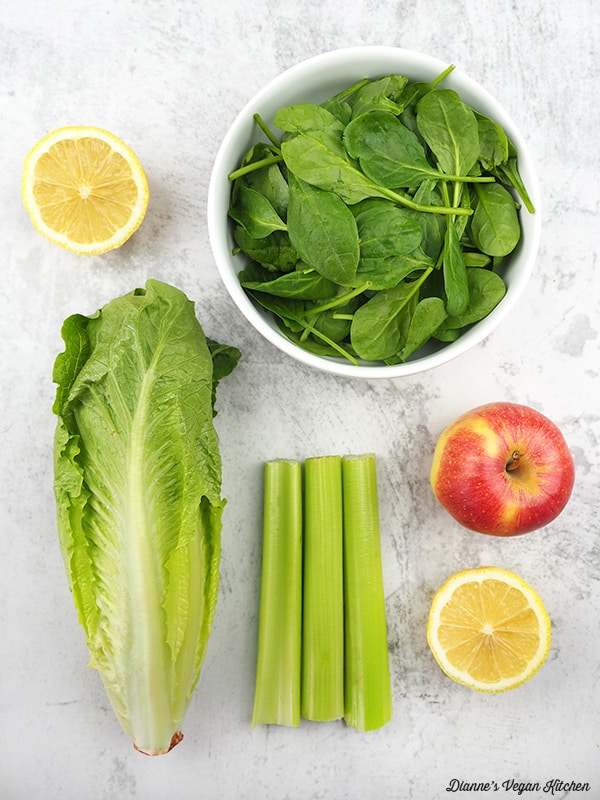 How to Make Green Juice
How to Make Green Juice
A juicer is essential, of course!
First, you’ll have to chop your veggies. The size depends on your juicer. If it’s a centrifugal or high-speed blade juicer, the pieces can be larger. If you have a slow masticating juicer, the pieces need to be on the smaller side.
Once everything is chopped, you simply run them through your juicer!
You can easily customize this recipe to your liking. If you’d rather use kale instead of spinach, go for it! Leafy lettuce can be used instead of romaine. You can throw in a little fresh ginger or turmeric to spice things up, if you like.
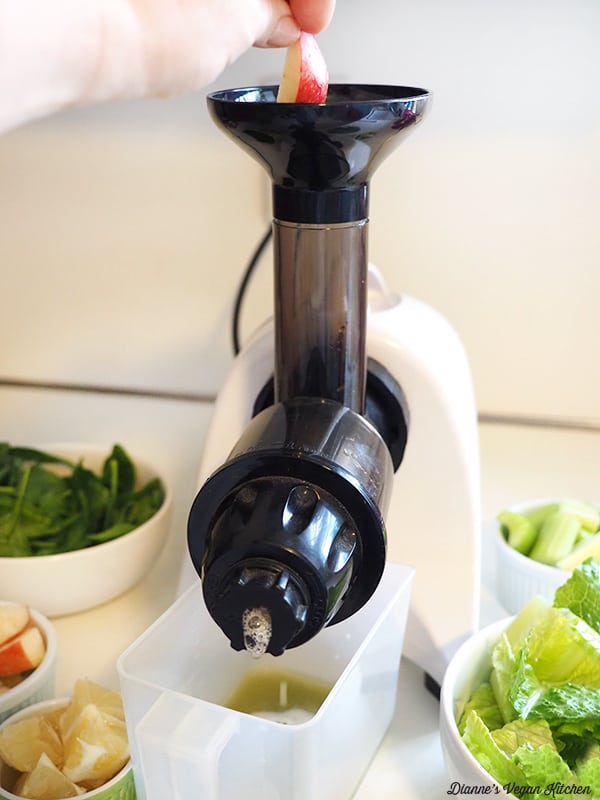 What to Do with Juice Pulp
What to Do with Juice Pulp
Don’t throw away your pulp! You can blend it into smoothies, use it to make vegetable stock, add it to muffins, and mix it into sauces. My favorite way to use my juice pulp is to make crackers with it.
 How Long Does Fresh Green Juice Last?
How Long Does Fresh Green Juice Last?
Fresh juice is best when consumed right away, but you can store it for a little while. If you have a centrifugal juicer, your juice can be stored in the fridge for up to 24 hours. If you have a masticating juicer, your juice can be refrigerated for 2 to 3 days.

My Favorite Green Juice

- 1 head of romaine lettuce
- 2 cups baby spinach (tightly packed)
- 1/2 cucumber
- 4 celery stalks
- 1 lemon (pealed and deseeded)
- 1 apple (cored)
- Chop veggies according to the type of juicer you have if its a slow masticating juicer, the pieces need to be on the smaller side. If it’s a high-speed blade juicer, the pieces can be larger.
-
Run everything through your juicer, starting with the leafy greens.
If you have a centrifugal juicer, your juice can be stored in the fridge for up to 24 hours. If you have a masticating juicer, your juice can be refrigerated for 2 to 3 days.

Other recipes you might enjoy include:

The post My Favorite Green Juice appeared first on Dianne’s Vegan Kitchen.



